May 21, 2025 | 05:04 GMT +7
May 21, 2025 | 05:04 GMT +7
Hotline: 0913.378.918
May 21, 2025 | 05:04 GMT +7
Hotline: 0913.378.918
The Ministry of Agriculture and Rural Development coordinated with Khanh Hoa Provincial People's Committee to organize a national workshop on agricultural extension on March 24 2023, in Nha Trang City, Khanh Hoa province.
The Ministry of Agriculture and Rural Development established an Action Plan to implement Government's Resolution No. 01/NQ-CP dated January 6, 2023, and the Sustainable Agriculture and Rural Development Strategy from 2021 to 2030 with a vision towards 2050. Accordingly, the National Center for Agricultural Extension provided 5 key directions for agricultural extension activities in the near future.
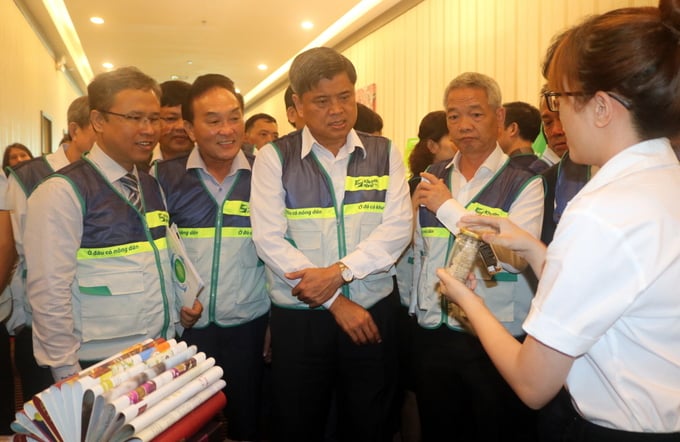
Deputy Minister Tran Thanh Nam and Khanh Hoa province's officials visiting the OCOP product booth at the 2023 national workshop on agricultural extension. Photo: KS.
Firstly, improve the efficiency of central agricultural extension projects.
Secondly, promote the socialization of agricultural extension services, mobilize the reciprocal capital contribution from businesses and partners to improve the efficiency of state resources. Furthermore, ensure the effectiveness, sustainability and extensiveness of agricultural extension projects and models.
Thirdly, modify the methods of conducting agricultural extension communication and training activities in line with the national tasks to restructure the agricultural sector, with emphasis on material areas, concentrated and large-scale commodity production areas, key seedlings. Maximize the application of smart technology, digital technology, and 4.0 technology.
Fourthly, reinforce the organizational system and strengthen the capacity for agricultural extension across all levels of the government. The central and grassroots levels need to be developed in a professional and modern direction.
Fifthly, promote international cooperation in agricultural extension: amplify collaboration, create new public-private partnerships and socialize the use of resources for agricultural extension projects.
Mr. Le Quoc Thanh, Director of the National Center for Agricultural Extension, believes that the agricultural sector is transitioning from production to economic thinking. Therefore, the agricultural extension system must also transform to approach multi-valued production in terms of efficiency and green growth.
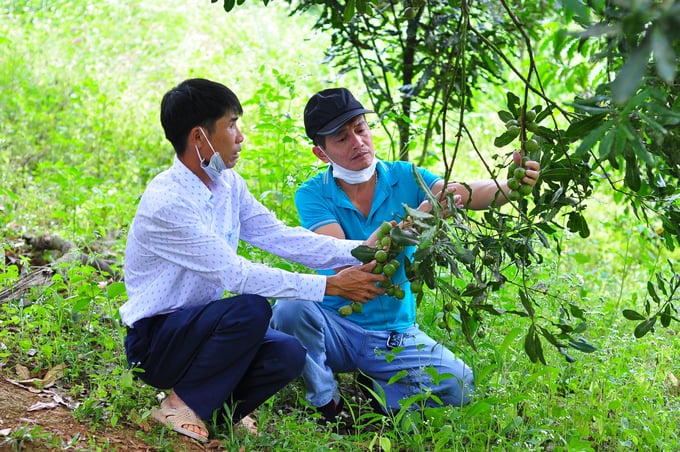
The agricultural extension system must transform to approach multi-valued agricultural production. Photo: MH.
"Agricultural extension activities must move away from the traditional route. We have to develop it towards a more modern approach to value-added agriculture and production efficiency", Mr. Le Quoc Thanh said. Moreover, the Ministry of Agriculture and Rural Development has approved the community extension project which has left a positive impact on the entire agricultural extension system.
The community extension group aims to connect technology-providing and technology transfer agencies with producers as well as connect producers with the market through businesses. Additionally, raw material areas will be standardized and strengthened. Consequently, agricultural extension activities will help farmers to produce with regard to market orientation and orders.
According to Mr. Le Quoc Thanh, agricultural extension activities are being developed toward multi-valued agriculture. Namely, these activities will integrate multiple values including circular economy, organic agricultural production, craft villages and OCOP products, new rural area construction, agri-tourism, preliminary processing, processing, preservation, consumption connection and many more.
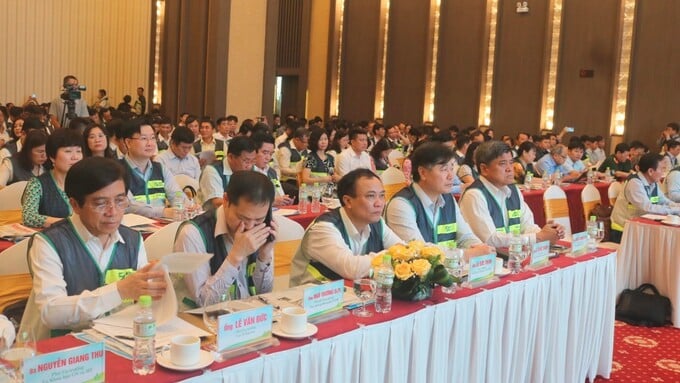
The 2023 National Workshop on Agricultural Extension in Nha Trang city, Khanh Hoa province was well-attended. Photo: KS.
Agricultural extension activities mainly focused on transferring technical advances in the past. On the other hand, activities under community extension groups will now promote the participation of many other stakeholders. As a result, agricultural extension works can now be accomplished by various actors including scientists, businesses, cooperatives, mass organizations, etc. Accordingly, they can engage in agricultural extension to promote policies, outstanding economic models, etc. Experienced, knowledgeable and well-informed farmers play the core role in implementing agricultural extension activities at the grassroots levels.
With the project to build community agricultural extension, the National Center for Agricultural Extension will strengthen the capacity for agricultural extension, thereby helping to professionalize and intellectualize agricultural producers. Agricultural extension activities must be integrated with digital agricultural extension to become the foundation of digital transformation in the sustainable development of agriculture, farmers and rural areas.
Participants at the workshop agreed that agricultural extension has been a necessity to Vietnam's agricultural development throughout history.
Deputy Minister Tran Thanh Nam commented on the development direction of agricultural extension activities in 2023 and the strategy for agricultural extension development until 2050: it is necessary to understand that the grassroots agricultural extension force as well as the agricultural community extension force are the indispensable mainstay.
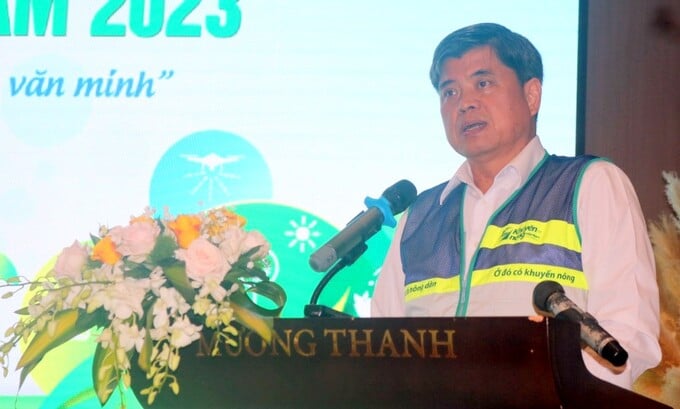
Deputy Minister of Agriculture and Rural Development Tran Thanh Nam at the workshop. Photo: KS.
These forces fully understand the state of agricultural production. They also accompany farmers and offer them guidance on technology transfer. In addition, these forces also support state management.
Deputy Minister Tran Thanh Nam assigned the National Center for Agricultural Extension to guide the building of community agricultural extension in 5 fields including: Transfer of science and technology, including information technology, digital technology to farmers; production consultation; consultation services for farmers; consultation on management, agricultural production and consultation on policies.
Agricultural extension must promote socialization, attract agricultural extension cooperatives and businesses. Most importantly, the central agricultural extension must assume a leading role, providing technical guidance to farmers, as well as mechanisms and policies for the state.
Regarding the implementation of models and projects, Deputy Minister Tran Thanh Nam said that the National Agricultural Extension Center should focus on coordinating with businesses to deploy at a macro level; build a large raw material area; establish linkage models with provinces. Provinces can deploy and build small-scale models to fully utilize local advantages and specialties.
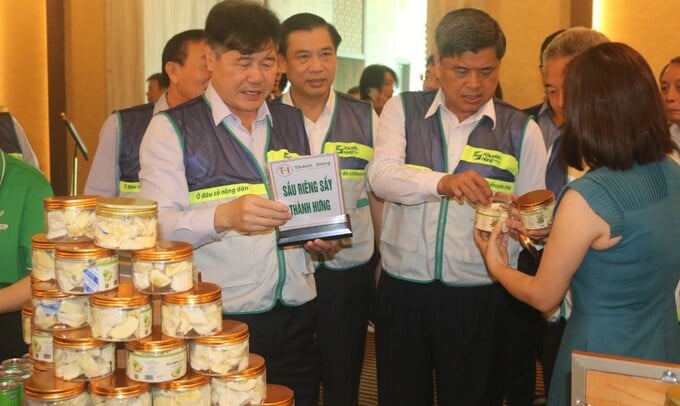
Deputy Minister Tran Thanh Nam and officials under the National Agricultural Extension Center visiting Khanh Hoa's dried durian exhibition booth. Photo: KS.
In addition, agricultural extension must determine the type of production in each field in association with local advantages with regard to urban extension. A city can be developed but the agricultural aspect must be maintained. On the other hand, it is necessary to focus on building a team of agricultural extension workers in the construction of new rural areas, digital agricultural extension and so on.
Deputy Minister Tran Thanh Nam noted that agricultural extension officers need to contribute to building a team of professional farmers. It is necessary to focus on improving the qualifications of agricultural extension workers. The National Center for Agricultural Extension must organize training courses for grassroots agricultural extension forces; local governments must also include these courses in regular training plans.
Regarding mechanisms and policies to support agricultural extension at the grassroots level, Deputy Minister Tran Thanh Nam believes that there should be research to honor grassroots extension workers. It is necessary to promote agricultural extension cooperation and international exchanges under the agricultural extension development strategy. Agricultural extension activities must be developed along with emphasis on agricultural product market and standard raw material areas to compete in the market.
Translated by Nguyen Hai Long

(VAN) Japan's grant aid project contributes to capacity building, promoting organic agricultural production, and fostering sustainable community development in Dong Thap province.

(VAN) For years, the CRISPR-Cas9 genome technology has been reshaping genetic engineering, a precision tool to transform everything from agriculture to medicine.

(VAN) Vietnam aims to become a 'leader' in the region in the capacity and managing effectively soil health and crop nutrition.
![Reducing emissions from rice fields: [Part 1] Farming clean rice together](https://t.ex-cdn.com/nongnghiepmoitruong.vn/608w/files/news/2025/05/05/z6509661417740_a647202949c539012a959e841c03e1d3-nongnghiep-143611.jpg)
(VAN) Growing clean rice helps reduce environmental pollution while increasing income, allowing farmers to feel secure in production and remain committed to their fields for the long term.
/2025/05/19/5136-1-144800_230.jpg)
(VAN) The Nghe An Provincial People's Committee has just approved the list of beneficiaries eligible for revenue from the Emission Reductions Payment Agreement (ERPA) in the North Central region for the year 2025.

(VAN) 14 out of 35 domesticated elephants in Dak Lak province have had their living conditions improved, with 11 of them currently participating in the non-riding elephant tourism model.

(VAN) Muong Nhe Nature Reserve hopes that being upgraded to a national park will lay the foundation for forest protection efforts to be carried out in a systematic, modern, and sustainable manner.